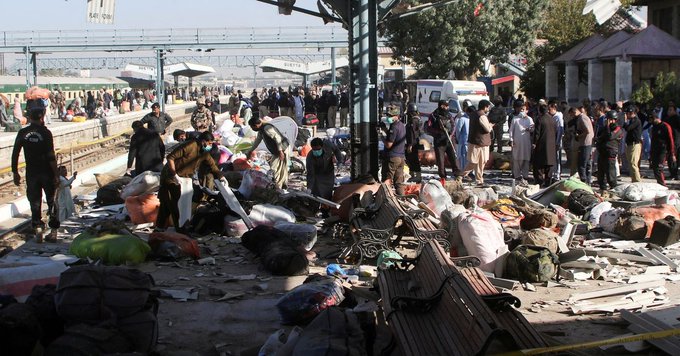World
Dozens killed in deadly train station bomb blast

A deadly bomb explosion at a railway station in Quetta, located in southwestern Pakistan, has claimed the lives of at least 24 people and left over 40 others injured, according to police and officials speaking to Reuters.
Pakistan is facing a rise in attacks by both separatist militants in Balochistan province and Islamist groups in its northwest. The ongoing insurgency in Balochistan has led to increased instability, raising concerns over the safety of projects targeting the province’s untapped natural resources.
Mouzzam Jah Ansari, the Inspector General of Police for Balochistan, confirmed the death toll from the bombing at the typically busy railway station. “The target was army personnel from the Infantry School,” Ansari stated, adding that many of the wounded are in critical condition.
READ ALSO :Female suicide bombers arrested 24 hours after bomb blasts in Borno
The separatist Baloch Liberation Army (BLA) has taken responsibility for the attack, claiming it as part of their ongoing fight for the independence of Balochistan, a province with a population of around 15 million people. The BLA argues that the government has exploited the region’s gas and mineral wealth without benefiting the local population.
Dr. Wasim Baig, a spokesman for the hospital, reported that 44 injured individuals were brought to a local medical facility. “So far 44 injured people have been brought to civil hospital,” he told Reuters.
Muhammad Baloch, Senior Superintendent of Police Operations, suggested that the explosion was likely a suicide bombing, and investigations are ongoing. “The blast took place inside the railway station when the Peshawar-bound express was about to leave for its destination,” Baloch explained.
In August, a series of militant attacks across Balochistan led to the deaths of at least 73 people, marking one of the deadliest outbreaks of violence in years. These attacks targeted police stations, railway lines, and highways, and were part of a broader insurgency aimed at securing the secession of the resource-rich southwestern province. Notably, the region hosts key China-backed infrastructure projects, including a port and a large gold and copper mine.
(REUTERS)

























